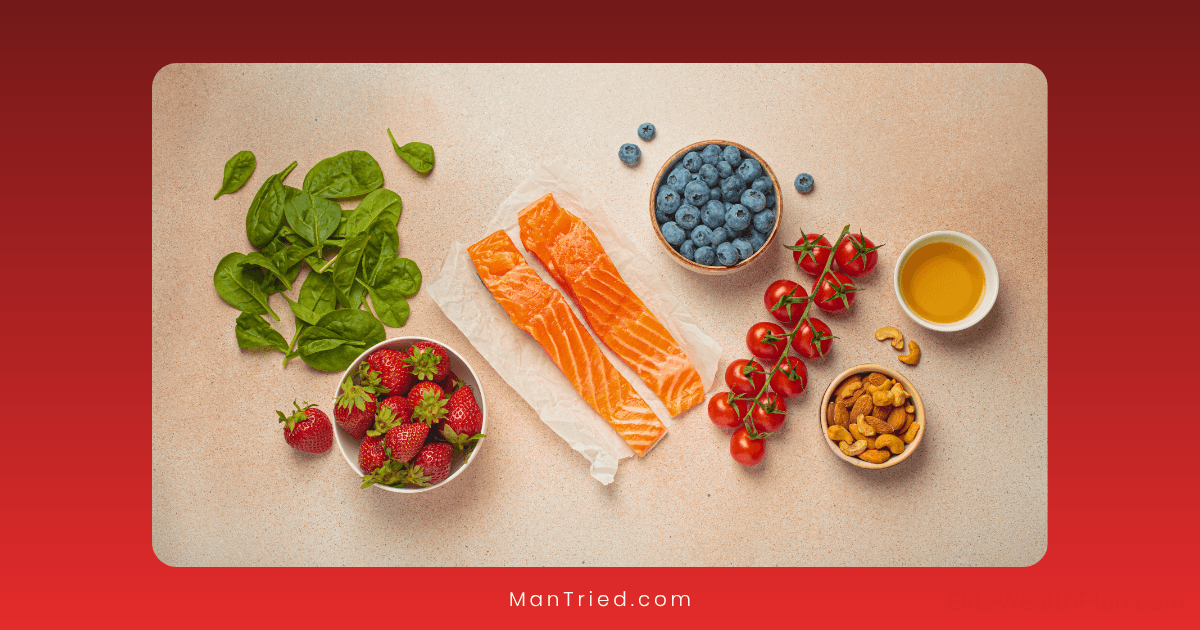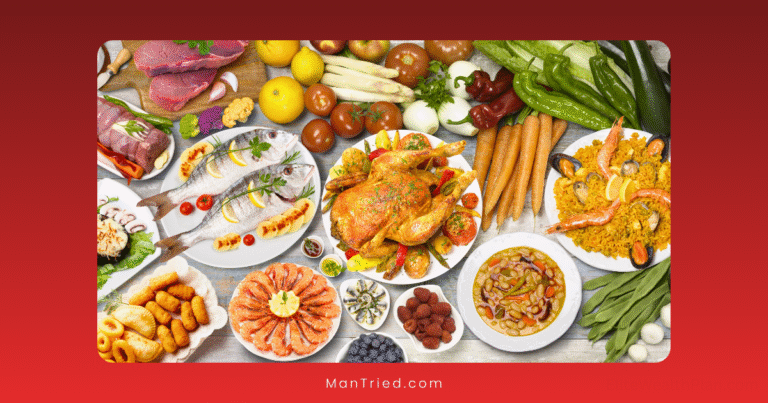Anti-Inflammatory Diet: Eating for Better Erectile Function

Erectile dysfunction (ED) affects millions of men worldwide, with projections suggesting the number will reach 322 million by 2025. While pharmaceutical interventions like Viagra and Cialis are common treatments, growing evidence suggests that addressing underlying inflammation through diet may provide a natural, effective approach to improving erectile function.
Research has established a clear link between inflammation and erectile dysfunction. A groundbreaking study published in PMC found that men with higher dietary inflammation scores had a 1.64 times higher risk of ED compared to those with lower scores. This connection makes sense when we understand that erections depend on healthy blood vessels, and inflammation is a primary driver of vascular damage.
This comprehensive guide explores how anti-inflammatory eating can improve erectile function, offering practical strategies to implement this approach in your daily life.
The Inflammation-Erectile Dysfunction Connection: Understanding the Mechanism
Before diving into specific dietary recommendations, it’s important to understand how inflammation impairs erectile function:
How Inflammation Damages Erectile Function
- Endothelial Dysfunction
The endothelium (inner lining of blood vessels) produces nitric oxide, a molecule essential for the vasodilation required for erections. Inflammation damages endothelial cells, reducing nitric oxide production and availability. - Arterial Plaque Formation
Chronic inflammation promotes atherosclerosis (plaque buildup in arteries), which restricts blood flow to the penis. Since penile arteries are smaller than coronary arteries, they often show damage earlier—making ED an early warning sign of cardiovascular disease. - Oxidative Stress
Inflammation increases oxidative stress, which damages tissues and blood vessels while depleting nitric oxide. According to a 2025 study in Frontiers in Nutrition, dietary antioxidant intake is inversely associated with ED risk. - Hormonal Disruption
Inflammatory cytokines can interfere with testosterone production and function, further compromising sexual health. - Nerve Damage
Inflammation can damage the nerves responsible for erectile function, particularly in men with conditions like diabetes.
Measuring Dietary Inflammation
Researchers use the Dietary Inflammation Index (DII) to quantify how inflammatory a person’s diet is. Foods are scored based on their known effects on inflammatory markers like C-reactive protein (CRP), interleukin-6 (IL-6), and tumor necrosis factor-alpha (TNF-α).
A higher DII score indicates a more inflammatory diet, while a lower score suggests an anti-inflammatory eating pattern.
Anti-Inflammatory Eating: Core Principles for Erectile Health
Based on the latest research, here are the fundamental principles of an anti-inflammatory diet specifically tailored for erectile function:
1. Emphasize Plant-Based Foods
A systematic review and meta-analysis found that plant-based diets were associated with a 29% reduced risk of erectile dysfunction. Plant foods are rich in antioxidants and phytonutrients that combat inflammation.
Key components:
- Colorful fruits and vegetables
- Legumes (beans, lentils, chickpeas)
- Whole grains
- Nuts and seeds
- Herbs and spices
2. Focus on Nitric Oxide Boosters
Nitric oxide is crucial for erectile function, as it relaxes penile blood vessels, allowing increased blood flow. Certain foods enhance nitric oxide production or bioavailability:
Top nitric oxide-boosting foods:
- Leafy greens: Spinach, arugula, and kale are rich in nitrates, which convert to nitric oxide in the body. According to Hims Health, “Arugula contains one of the highest concentrations of dietary nitrates among green leafy vegetables.”
- Beets: Research shows beets can increase nitric oxide levels by 21% within 45 minutes of consumption.
- Watermelon: Contains L-citrulline, which converts to L-arginine and then to nitric oxide. The lycopene in watermelon also has nitric oxide-boosting effects.
- Pomegranates: Rich in polyphenols that enhance nitric oxide synthase activity and protect nitric oxide from oxidative stress.
- Citrus fruits: Contain vitamin C and flavonoids that support nitric oxide production and stability. A 10-year study found that men consuming the most flavonoids had a 9-11% reduced incidence of ED.
- Dark chocolate: Contains flavanols that activate nitric oxide synthase. Choose varieties with 70% or higher cacao content for maximum benefits.
- Garlic and onions: Contain allicin, which acts as a vasodilator and has anti-inflammatory properties.
3. Incorporate Healthy Fats
Not all fats are inflammatory. Omega-3 fatty acids have potent anti-inflammatory effects, while certain omega-6 fatty acids (especially when consumed in excess) and trans fats promote inflammation.
Anti-inflammatory fat sources:
- Fatty fish (salmon, mackerel, sardines)
- Extra virgin olive oil
- Avocados
- Nuts (especially walnuts)
- Seeds (flaxseeds, chia seeds)
A 2023 study indicated that higher intake of omega-3 fatty acids may reduce sexual dysfunction linked to environmental pollutants.
4. Minimize Pro-Inflammatory Foods
Certain foods can trigger inflammatory responses, potentially worsening erectile dysfunction:
Foods to limit or avoid:
- Processed meats (bacon, sausage, deli meats)
- Refined carbohydrates (white bread, pastries, sugary cereals)
- Added sugars (sodas, candy, many packaged foods)
- Trans fats (partially hydrogenated oils)
- Excessive alcohol
- Fried foods
5. Support Gut Health
Emerging research suggests gut health plays a significant role in systemic inflammation. An unhealthy gut microbiome can increase inflammatory markers throughout the body, potentially affecting erectile function.
Gut-supporting foods:
- Fermented foods (yogurt, kefir, sauerkraut, kimchi)
- Prebiotic-rich foods (garlic, onions, asparagus, bananas)
- High-fiber foods (beans, whole grains, fruits, vegetables)
According to Dr. Ruscio, “Gut health plays a significant role in erectile dysfunction, with dysbiosis potentially leading to inflammation, hormonal imbalances, and mood alterations.”
The 21-Day Anti-Inflammatory Eating Plan for Erectile Function
This three-week plan gradually introduces anti-inflammatory eating principles, focusing specifically on foods that support erectile health:
Week 1: Foundation – Reducing Inflammatory Foods
Focus: Eliminate major inflammatory triggers while introducing key anti-inflammatory foods.
Daily goals:
- Eliminate processed foods, sugary beverages, and refined carbohydrates
- Add 1-2 servings of leafy greens daily
- Include at least 2 servings of colorful fruits
- Swap refined oils (vegetable, corn, soybean) for olive oil
- Reduce red meat to 1-2 servings weekly maximum
Sample day:
Breakfast: Greek yogurt with berries, walnuts, and a drizzle of honey
- ED benefit: Antioxidants from berries, omega-3s from walnuts, probiotics from yogurt
Lunch: Large salad with mixed greens, grilled chicken, avocado, cherry tomatoes, and olive oil dressing
- ED benefit: Nitrates from greens, healthy fats from avocado and olive oil
Dinner: Baked salmon with roasted garlic, steamed broccoli, and quinoa
- ED benefit: Omega-3s from salmon, allicin from garlic, fiber from quinoa
Snack: Apple slices with almond butter
- ED benefit: Flavonoids from apple, healthy fats and protein from almond butter
Week 2: Enhancement – Boosting Nitric Oxide Production
Focus: Strategically incorporate foods known to boost nitric oxide levels.
Daily goals:
- Include at least one nitrate-rich food at each meal
- Add 1-2 servings of antioxidant-rich berries daily
- Incorporate garlic or onions into at least one meal
- Consume 1-2 servings of legumes daily
- Stay well-hydrated (2-3 liters of water daily)
Sample day:
Breakfast: Spinach and mushroom omelet with a side of mixed berries
- ED benefit: Nitrates from spinach, antioxidants from berries
Lunch: Arugula salad with lentils, roasted beets, walnuts, and olive oil dressing
- ED benefit: High nitrate content from arugula and beets, protein from lentils
Dinner: Garlic and herb grilled chicken with roasted sweet potatoes and sautéed kale
- ED benefit: Allicin from garlic, nitrates from kale, antioxidants from sweet potatoes
Snack: Dark chocolate (70%+ cacao) and pomegranate seeds
- ED benefit: Flavanols from chocolate, polyphenols from pomegranate
Week 3: Optimization – Comprehensive Anti-Inflammatory Approach
Focus: Integrate all aspects of anti-inflammatory eating with special attention to timing and combinations for maximum benefit.
Daily goals:
- Combine nitric oxide boosters with healthy fats for better absorption
- Include at least 30g of fiber daily from varied plant sources
- Incorporate anti-inflammatory spices (turmeric, ginger, cinnamon)
- Practice mindful eating to reduce stress-induced inflammation
- Consider timing of nitric oxide-boosting foods (2-3 hours before sexual activity)
Sample day:
Breakfast: Overnight oats with chia seeds, blueberries, cinnamon, and almond butter
- ED benefit: Fiber from oats and chia, antioxidants from blueberries, anti-inflammatory cinnamon
Lunch: Mediterranean bowl with quinoa, chickpeas, cucumber, tomatoes, olives, feta, and tahini dressing
- ED benefit: Complete anti-inflammatory meal pattern, rich in fiber and healthy fats
Dinner: Turmeric-ginger salmon with watermelon, arugula, and avocado salad
- ED benefit: Omega-3s from salmon, citrulline from watermelon, nitrates from arugula, anti-inflammatory turmeric and ginger
Snack: Handful of pistachios and an orange
- ED benefit: L-arginine from pistachios, vitamin C and flavonoids from orange
Specific Anti-Inflammatory Foods and Their Benefits for Erectile Function
Let’s explore the science behind specific foods that combat inflammation and support erectile health:
1. Berries
Berries are among the most potent anti-inflammatory foods, packed with anthocyanins and other polyphenols.
Research insight: Regular consumption of antioxidant-rich fruits like strawberries and blueberries is linked to a 19% lower likelihood of experiencing erectile dysfunction.
Practical tip: Aim for 1/2 cup of mixed berries daily, either as a snack, in smoothies, or added to breakfast.
2. Fatty Fish
Salmon, mackerel, sardines, and other fatty fish are rich in omega-3 fatty acids EPA and DHA, which have powerful anti-inflammatory effects.
Research insight: Omega-3 fatty acids found in fish can increase nitric oxide production and have anti-inflammatory effects that benefit vascular function.
Practical tip: Include fatty fish 2-3 times weekly, or consider a high-quality fish oil supplement if you don’t consume fish.
3. Extra Virgin Olive Oil
The cornerstone of the Mediterranean diet, olive oil contains oleocanthal, which has anti-inflammatory effects similar to ibuprofen.
Research insight: Olive oil, particularly extra virgin and unrefined, is associated with improved erectile function as part of the Mediterranean diet.
Practical tip: Use as your primary cooking oil and in salad dressings, aiming for 2-3 tablespoons daily.
4. Leafy Greens
Spinach, kale, arugula, and other leafy greens are packed with antioxidants and nitrates that support nitric oxide production.
Research insight: Nitrates in foods like arugula and spinach are linked to increased nitric oxide production, which can help improve erectile function by enhancing blood flow.
Practical tip: Include at least 2 cups of leafy greens daily, either in salads, smoothies, or cooked dishes.
5. Nuts
Walnuts, almonds, pistachios, and other nuts provide healthy fats, antioxidants, and L-arginine, which supports nitric oxide production.
Research insight: Studies indicate that nuts can improve erectile and sexual function, with pistachios showing particular promise.
Practical tip: Consume a small handful (about 1 ounce) of mixed nuts daily as a snack or added to meals.
6. Turmeric
This bright yellow spice contains curcumin, a compound with potent anti-inflammatory and antioxidant properties.
Research insight: Curcumin has been shown to improve endothelial function and reduce inflammatory markers associated with erectile dysfunction.
Practical tip: Add to smoothies, soups, curries, or take as a supplement (with black pepper for better absorption).
7. Green Tea
Rich in catechins, green tea has anti-inflammatory effects and supports vascular health.
Research insight: Green tea contains catechins that improve blood pressure and cholesterol levels, thus benefiting erectile function.
Practical tip: Drink 2-3 cups daily, preferably between meals for better catechin absorption.
Implementing Anti-Inflammatory Eating: Practical Strategies
Transitioning to an anti-inflammatory diet doesn’t have to be overwhelming. Here are practical strategies to make this approach sustainable:
1. Gradual Implementation
Rather than overhauling your entire diet at once, make incremental changes:
- Week 1: Focus on adding anti-inflammatory foods
- Week 2: Begin reducing pro-inflammatory foods
- Week 3: Fine-tune portions and timing
2. The Plate Method
Structure your meals using this simple template:
- 1/2 plate: Non-starchy vegetables (especially leafy greens)
- 1/4 plate: Lean protein or plant protein
- 1/4 plate: Whole grains or starchy vegetables
- Add: 1-2 tablespoons of healthy fat (olive oil, avocado, nuts)
3. Strategic Timing for Sexual Health
Consider timing certain foods for maximum erectile benefit:
- Consume nitrate-rich foods 2-3 hours before anticipated sexual activity
- Avoid heavy, high-fat meals before sexual activity, which can divert blood flow to digestion
- Stay well-hydrated throughout the day, but limit fluids 1 hour before sexual activity
4. Batch Cooking and Meal Prep
Prepare anti-inflammatory components in advance:
- Roast a large batch of vegetables with olive oil and garlic
- Cook whole grains in bulk
- Prepare homemade salad dressings with olive oil and anti-inflammatory herbs
- Cut up fruits and vegetables for easy snacking
5. Smart Substitutions
Make these simple swaps to reduce inflammatory foods while enhancing erectile function:
- Replace refined oils (vegetable, corn, soybean) with extra virgin olive oil
- Swap red meat for fatty fish or plant proteins
- Choose dark chocolate (70%+ cacao) instead of milk chocolate or candy
- Replace white bread, pasta, and rice with whole grain versions
- Substitute sugary beverages with green tea, pomegranate juice, or infused water
- Use herbs and spices instead of salt for flavoring
- Replace store-bought salad dressings with olive oil and vinegar or lemon juice
- Choose fresh or frozen fruits instead of canned varieties with added syrup
6. Dining Out Strategies
Maintaining an anti-inflammatory approach when eating out:
- Preview menus online to identify anti-inflammatory options
- Request olive oil and vinegar instead of commercial dressings
- Ask for double vegetables instead of refined carbohydrates
- Choose grilled, baked, or steamed dishes over fried options
- Request sauces and dressings on the side
- Look for Mediterranean, Japanese, or plant-forward restaurants
7. Supplements to Consider
While whole foods should be the foundation, certain supplements may enhance an anti-inflammatory approach:
- Omega-3 fatty acids (if not consuming fatty fish regularly)
- Curcumin (the active compound in turmeric)
- Quercetin (a flavonoid with anti-inflammatory properties)
- Resveratrol (found in red grapes and berries)
- Vitamin D (if deficient, which is common in men with ED)
Important: Consult with a healthcare provider before starting any supplements, especially if you’re taking medications.
Timeline: What to Expect When Adopting Anti-Inflammatory Eating
Understanding the typical timeline for improvements can help maintain motivation:
Short-term (1-2 weeks)
- Reduced bloating and digestive discomfort
- Improved energy levels
- Better sleep quality
- Potential reduction in general inflammation markers
Medium-term (2-4 weeks)
- Noticeable improvements in mood and mental clarity
- Reduction in systemic inflammation markers
- Initial improvements in erectile quality, particularly morning erections
- Better endothelial function
Long-term (1-3 months)
- Significant improvements in erectile function
- Reduced dependency on ED medications for some men
- Improved cardiovascular markers (blood pressure, cholesterol)
- Sustainable weight management
- Enhanced overall sexual satisfaction
Research insight: A 2025 study in Frontiers in Nutrition found that dietary quality, particularly anti-inflammatory and antioxidant properties, plays a crucial role in sexual health and ED risk, with effects becoming more pronounced over time.
Beyond Diet: Complementary Approaches to Reducing Inflammation
While diet is foundational, other lifestyle factors can either amplify or undermine your anti-inflammatory efforts:
1. Regular Physical Activity
Exercise reduces inflammation through multiple mechanisms:
- Improves insulin sensitivity
- Reduces visceral fat (a source of inflammatory cytokines)
- Enhances nitric oxide production
- Improves circulation
Recommendation: Aim for 150 minutes of moderate activity weekly, including both cardiovascular exercise and strength training.
2. Stress Management
Chronic stress triggers inflammation through elevated cortisol levels:
- Practice daily mindfulness or meditation (10-20 minutes)
- Prioritize activities that promote relaxation
- Consider stress-reducing practices like yoga or tai chi
- Maintain social connections, which buffer against stress
3. Quality Sleep
Poor sleep increases inflammatory markers and is independently associated with erectile dysfunction:
- Aim for 7-9 hours of quality sleep nightly
- Maintain a consistent sleep schedule
- Create a sleep-promoting environment (cool, dark, quiet)
- Limit screen time before bed
4. Environmental Toxin Reduction
Certain environmental exposures can trigger inflammation:
- Choose organic produce when possible, especially for the “Dirty Dozen”
- Filter drinking water
- Use natural cleaning products
- Avoid plastics containing BPA and phthalates
- Consider air purification in your home
Special Considerations: Adapting Anti-Inflammatory Eating for Specific Conditions
Certain health conditions require tailored approaches to anti-inflammatory eating for erectile function:
Diabetes
- Emphasize low-glycemic foods
- Time carbohydrate intake strategically
- Include cinnamon, which may improve insulin sensitivity
- Prioritize fiber-rich foods that stabilize blood sugar
Cardiovascular Disease
- Further limit sodium intake
- Emphasize plant sterols (found in nuts, seeds, legumes)
- Include foods rich in potassium (bananas, potatoes, leafy greens)
- Consider the DASH or Portfolio diet principles
Obesity
- Focus on energy density (foods with fewer calories per volume)
- Emphasize protein at each meal for satiety
- Consider intermittent fasting approaches, which reduce inflammation
- Include metabolism-supporting foods like chili peppers and green tea
Low Testosterone
- Ensure adequate healthy fat intake
- Include zinc-rich foods (oysters, pumpkin seeds, beef)
- Don’t over-restrict calories
- Include cholesterol sources (eggs, shellfish) in moderation, as cholesterol is a precursor to testosterone
Case Studies: Real-World Success with Anti-Inflammatory Eating
Case 1: Mark, 48 – Metabolic Syndrome and ED
Background:
- Overweight (BMI 31)
- High blood pressure and pre-diabetes
- Taking ED medication with diminishing results
- High inflammatory diet (fast food, processed meats, refined carbs)
Anti-inflammatory approach:
- Mediterranean diet framework
- Emphasis on leafy greens, berries, fatty fish, and olive oil
- Elimination of refined carbohydrates and processed foods
- Addition of daily turmeric, garlic, and green tea
Results after 3 months:
- 18 pounds weight loss
- Blood pressure normalized
- Fasting glucose improved
- ED medication needed only occasionally rather than regularly
- Morning erections returned
- Self-reported 70% improvement in erectile function
Case 2: David, 35 – Stress-Induced ED and Inflammation
Background:
- Normal weight but high stress job
- Poor sleep quality
- Recent onset of erectile difficulties
- High consumption of convenience foods and caffeine
Anti-inflammatory approach:
- Focus on stress-reducing foods (magnesium-rich foods, omega-3s)
- Elimination of excess caffeine
- Addition of antioxidant-rich berries and dark chocolate
- Implementation of meal prepping to reduce reliance on convenience foods
Results after 2 months:
- Stress levels significantly reduced
- Sleep quality improved
- Complete resolution of erectile difficulties
- Improved energy and mood
- Inflammatory markers (measured via CRP) reduced by 65%
Conclusion: A Sustainable Approach to Better Sexual Health
The connection between inflammation and erectile dysfunction offers a powerful opportunity to improve sexual health through dietary choices. By adopting an anti-inflammatory eating pattern rich in nitric oxide-boosting foods, you’re not only addressing symptoms but targeting a root cause of erectile dysfunction.
Remember that consistency matters more than perfection. Small, sustainable changes implemented over time will yield better results than short-term, drastic measures. As you incorporate more anti-inflammatory foods and reduce inflammatory triggers, you’ll likely notice benefits extending beyond sexual health—including improved energy, better mood, enhanced cognitive function, and reduced risk of chronic disease.
The evidence is clear: what’s good for your overall health is good for your sexual health. An anti-inflammatory diet represents one of the most effective, sustainable approaches to improving erectile function while enhancing quality of life across multiple dimensions.
Common Questions About Anti-Inflammatory Eating for Erectile Function
While individual responses vary, many men notice initial improvements within 2-4 weeks of consistent anti-inflammatory eating. More significant changes typically occur after 1-3 months. Morning erections, which are a good indicator of vascular health, often improve first.
A sustainable approach allows for occasional consumption of less optimal foods. Consider following the 80/20 rule—focus on anti-inflammatory choices 80% of the time, allowing flexibility for the remaining 20%. However, some individuals may be particularly sensitive to certain inflammatory triggers and might benefit from stricter elimination.
For some men, especially those whose ED is primarily related to metabolic or inflammatory issues, dietary changes may significantly reduce or eliminate the need for medications. However, this varies by individual and depends on the underlying causes of ED. Always consult with a healthcare provider before adjusting medications.
Anti-inflammatory eating is most effective for ED with vascular or metabolic origins. While it can help with most forms of ED to some degree, cases primarily caused by structural issues, severe hormonal deficiencies, or psychological factors may require additional interventions alongside dietary changes.
While ketogenic and paleo diets may offer some anti-inflammatory benefits, they don’t specifically target all the nutritional factors that support erectile function. The approach outlined here incorporates elements from various evidence-based dietary patterns (Mediterranean, DASH, plant-forward) with specific emphasis on foods that support nitric oxide production and vascular health.






